

Court
NQ Ethical Hacking Student
Big Data. Demand for data scientists is booming and will only increase. It's a great time to be a data scientist entering the job market.
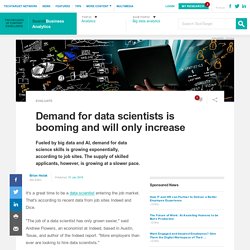
That's according to recent data from job sites Indeed and Dice. What Will Data Science Jobs Look Like In The Future? What will data science jobs look like in the future?
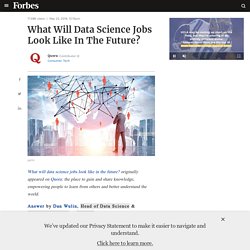
Originally appeared on Quora: the place to gain and share knowledge, empowering people to learn from others and better understand the world. Answer by Dan Wulin, Head of Data Science & Machine Learning at Wayfair, on Quora: I’ll get into my response, but will caveat it by saying that, given this is a projection into the future, I am likely to be wrong. Hopefully the response will be somewhat thought-provoking, though. I’ll start by summarizing three broader trends: Increasingly complex data science algorithms will continue to be subsumed in packages and technologies that make them orders of magnitude easier to deploy: Consider what the experience of training and deploying (at scale) something like a random forest is like today compared to ten years ago - it is orders of magnitude faster to apply, can be done with a higher degree of quality & with less technical and statistical knowledge.
New code of conduct for artificial intelligence (AI) systems used by the NHS. A new code of conduct for artificial intelligence and other data-driven technologies will ensure that only the best and safest systems are used by the NHS.
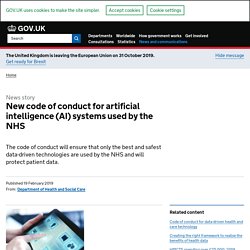
The code encourages technology companies to meet a gold-standard set of principles to protect patient data to the highest standards. The NHS, big data and a bright future Phil Groom – Bond Digital Health Phil Groom, commercial director of Bond Digital Health, discusses the potentials of big data in the NHS.
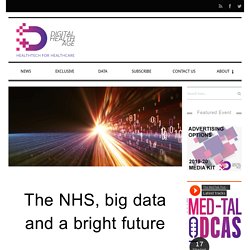
The UK Government has set out to make England’s National Health Service the “most cutting-edge system in the world” by supporting innovative digital technology-based solutions to help solve its most difficult problems. For a system that in part still relies on paper notes, fax machines and out-of-date operating systems that might seem at first to be a lofty aim. But with money set aside to help NHS Trusts foster innovation and deals signed with leading digital health firms to deliver change, the Department for Health appears to be serious in its intentions.
NHS to log private healthcare data to address gaps in care records. The NHS will begin recording data from the private healthcare sector for the first time, in an attempt to bridge gaps in patient health records and improve the quality of available information.
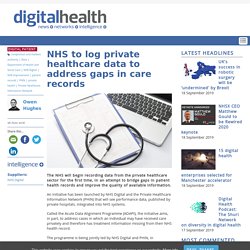
An initiative has been launched by NHS Digital and the Private Healthcare Information Network (PHIN) that will see performance data, published by private hospitals, integrated into NHS systems. Called the Acute Data Alignment Programme (ADAPt), the initiative aims, in part, to address cases in which an individual may have received care privately and therefore has treatment information missing from their NHS health record. The programme is being jointly led by NHS Digital and PHIN, in partnership with the Department of Health and Social Care, NHS England, NHS Improvement, and the Care Quality Commission (CQC).
The information banks keep about you and your spending and how it's used - ABC Life. Remember the last time you opened a bank account or applied for a credit card?

You probably gathered up your paperwork and handed over your name, address and payslips, hoping to be approved. Given what we willingly provide them, you'd expect banks to have a certain level of information about us. But you'd likely be surprised to find out exactly how much they really know, says Professor Dimity Kingsford Smith, a corporate regulation expert from the University of New South Wales.
Getting your data out of Tinder is hard. It shouldn't be. When a journalist approached me to help her get a copy of her personal data from Tinder, I knew this would be a good story.
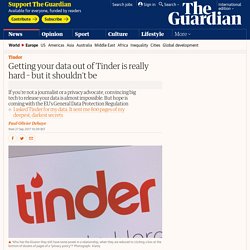
I asked Tinder for my data. It sent me 800 pages of my deepest, darkest secrets. T 9.24pm (and one second) on the night of Wednesday 18 December 2013, from the second arrondissement of Paris, I wrote “Hello!”
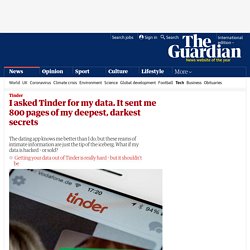
To my first ever Tinder match. Since that day I’ve fired up the app 920 times and matched with 870 different people. I recall a few of them very well: the ones who either became lovers, friends or terrible first dates. I’ve forgotten all the others. Difference between Data and Information with Practical Examples. With information systems playing a bigger role in most businesses, it is worthwhile to take a step back and consider the differences between information and data.
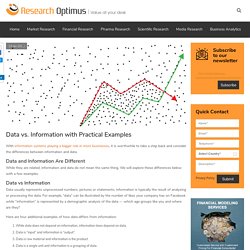
Data and Information Are Different While they are related, information and data do not mean the same thing. We will explore these differences below with a few examples. Data vs Information. What Is Datafication and How Can It Impact Your Business? Analytics Training Blog. The complicated truth about China's social credit system. China's social credit system has been compared to Black Mirror, Big Brother and every other dystopian future sci-fi writers can think up. Big Data. Privacy policy. Effective as of May 25, 2018 1 Introduction 2 About this Policy 3 Your rights and your preferences: Giving you choice and control 4 How do we collect your personal data?
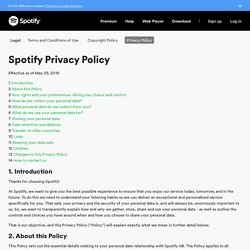
Spotify Publishing Analytics. Introducing Spotify Publishing Analytics in Beta — Spotify. We know that there are usually many more people involved in the creation of your favorite song than just the artist whose face appears on the billboard. We celebrate those songwriters and producers through our Secret Genius program, and we help listeners discover their work with song credits on desktop and mobile. Today, we’re continuing that support by introducing a brand new tool for the publishing community. Spotify Publishing Analytics is the first analytics tool from a music streaming service built specifically for publishers, so they can better serve their songwriters. “One of our core missions at Spotify is to enable creators the opportunity to live off their art,” said Jules Parker, Head of Publishing Relations & Services, EMEA and APAC, Spotify. How big data has changed the music industry.
'Big data is about to become a very big problem for the music industry.' The following MBW blog comes from Alan Graham (pictured), who is co-founder and Chief Technology Officer of UK-based OCL which specializes in making copyright compatible with technology. OCL’s Totem Framework allows rights owners from creative industries (music, images, text, video, etc.) to be able to instantly communicate the allowed intent of their assets with each other. IMS Business Report 2019 vFinal. Beyond The Three V's of Big Data - Viscosity and Virality. Revisiting the Three V’s of Big Data It’s time to revisit that original post from July 4th, 2011 post on the the Three V’s of big data. Here’s the recap: Traditionally, big data describes data that’s too large for existing systems to process. Over the past three years, experts and gurus in the space have added additional characteristics to define big data. Electronic Music Blogs. MoneyballingMusicbyPrithwijitMukerjiPubl.Jan2015.
IMS publishes annual report on electronic music industry. The wide-ranging report, which summarises consumer trends, growth forecasts and sales data, shows a modest two per cent dip in the monetary value of the industry overall. International Music Summit (IMS) has published its latest annual report. The 28-page report observed industry successes in all four categories—recorded music, DJs and live acts, clubs and festivals, and companies and brands, though year-on-year growth for the entire industry dipped slightly (£7.3bn, a two per cent drop from last year.) In the recorded music category, market share for electronic music in Europe and North America receded slightly. The percentage of people consuming electronic music in Germany (6.4 per cent, down from seven per cent) and the UK (11.6 per cent, down from 15.4 per cent) fell from the previous year. Surging interest in other styles of music, including pop and hip-hop, led to this dip in the UK, said the report.
The report shows widespread industry gains elsewhere. Music 2025.